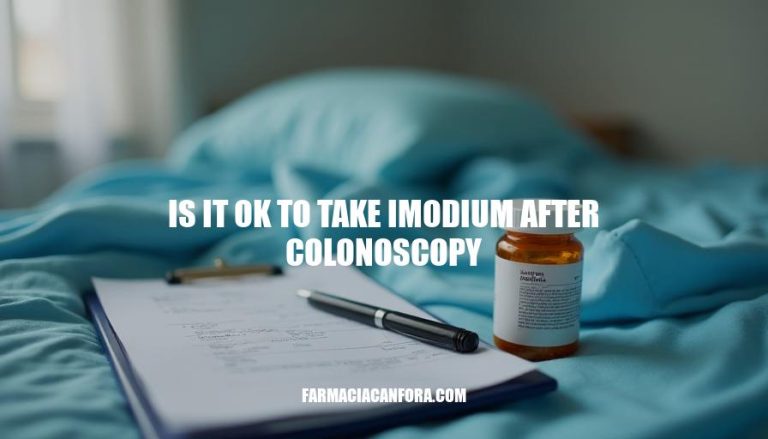


After a colonoscopy“>colonoscopy, managing post-procedure symptoms is crucial for a smooth recovery. One common question is whether it’s safe to take Imodium to alleviate diarrhea. Generally, it is considered safe to use Imodium after a colonoscopy to manage symptoms like diarrhea or loose stools, but it’s important to consult with your doctor first to ensure it’s appropriate for your specific situation. Proper post-procedure care helps in minimizing discomfort and promoting a quicker return to normal activities.
Imodium (generic name: loperamide) is an over-the-counter medication used to treat diarrhea. It works by slowing down the movement of the intestines, allowing more water to be absorbed, which helps to firm up stools.
Common uses of Imodium include:
After a colonoscopy, some people might experience diarrhea or loose stools due to the bowel preparation and the procedure itself. Taking Imodium can help manage these symptoms by reducing the frequency of bowel movements and making stools firmer. However, it’s important to consult with a doctor before taking Imodium post-colonoscopy to ensure it’s safe and appropriate for your specific situation.
After a colonoscopy, it’s common to experience symptoms like bloating, gas pains, mild cramping, and minor bleeding. These symptoms occur because the procedure involves inflating the colon with air for better visibility and sometimes removing polyps or taking biopsies.
These symptoms might lead someone to ask if it’s okay to take Imodium because Imodium is used to treat diarrhea, which can be a concern if the bowel movements are frequent or uncomfortable after the procedure. However, it’s important to consult a doctor before taking any medication post-colonoscopy to ensure it’s safe and won’t interfere with recovery.
Taking Imodium (loperamide) after a colonoscopy is generally considered safe for managing symptoms like diarrhea or loose stools. However, it’s important to consult your doctor first. Here are some key points:
Here are some anecdotal experiences and patient testimonials regarding taking Imodium after a colonoscopy:
Patient on Crohn’s Disease Forum: “I had my colonoscopy this morning and was back home by 2pm. I finally ate something after nearly 2 days, but soon after, I was back on the toilet with diarrhea. I took Imodium, and it stopped the diarrhea without any issues”.
Forum Member’s Caution: “I’ve heard there is a potential issue with Imodium and IBD, something called ‘mega colon.’ You may want to ask around before going that route. There are some natural remedies for diarrhea, like a solution of corn starch in water”.
Another Patient’s Experience: “I take a dose of Imodium every day for my Crohn’s. After my colonoscopy, I took it to stop the really bad bouts of diarrhea, and it worked well without any problems”.
General Advice: “Imodium is generally safe to take after a colonoscopy for managing symptoms such as diarrhea or loose stools. However, it’s important to consult with your doctor before taking the medication”.
These experiences highlight that while some patients have successfully used Imodium after a colonoscopy, it’s crucial to consult with a healthcare provider to ensure it’s safe for your specific situation.
After a colonoscopy, managing post-procedure symptoms is crucial for a smooth recovery. It’s generally considered safe to use Imodium (loperamide) to alleviate diarrhea or loose stools, but it’s essential to consult with your doctor first to ensure it’s appropriate for your specific situation.
Imodium is an over-the-counter medication used to treat diarrhea by slowing down the movement of the intestines, allowing more water to be absorbed, which helps to firm up stools. Common uses include treating acute diarrhea from viral infections, food poisoning, or traveler’s diarrhea, as well as managing chronic diarrhea associated with conditions like irritable bowel syndrome (IBS) or inflammatory bowel disease (IBD).
After a colonoscopy, some people might experience diarrhea or loose stools due to the bowel preparation and the procedure itself. Taking Imodium can help manage these symptoms by reducing the frequency of bowel movements and making stools firmer. However, it’s crucial to consult with a doctor before taking Imodium post-colonoscopy to ensure it’s safe and won’t interfere with recovery.
Symptoms like bloating, gas pains, mild cramping, and minor bleeding are common after a colonoscopy due to the procedure involving inflating the colon with air for better visibility and sometimes removing polyps or taking biopsies. These symptoms might lead someone to ask if it’s okay to take Imodium because it’s used to treat diarrhea.
Taking Imodium (loperamide) after a colonoscopy is generally considered safe for managing symptoms like diarrhea or loose stools, but it’s essential to consult your doctor first. The benefits of taking Imodium include symptom relief, while potential risks include side effects such as constipation, dizziness, and abdominal pain, interactions with other medications, and underlying conditions like liver or kidney disease.
Expert recommendations emphasize the importance of consultation with a doctor regarding post-colonoscopy care, staying hydrated to prevent fluid loss due to diarrhea, and being cautious when taking Imodium, especially for those with underlying medical conditions.
Anecdotal experiences from patients who have taken Imodium after a colonoscopy highlight its effectiveness in managing symptoms like diarrhea. However, it’s crucial to consult with a healthcare provider to ensure it’s safe for your specific situation.
In conclusion, while some patients have successfully used Imodium after a colonoscopy, it’s essential to consult with a doctor before taking the medication to ensure it’s safe and won’t interfere with recovery. With proper post-procedure care and consultation with a healthcare provider, managing symptoms like diarrhea or loose stools can be effectively managed.